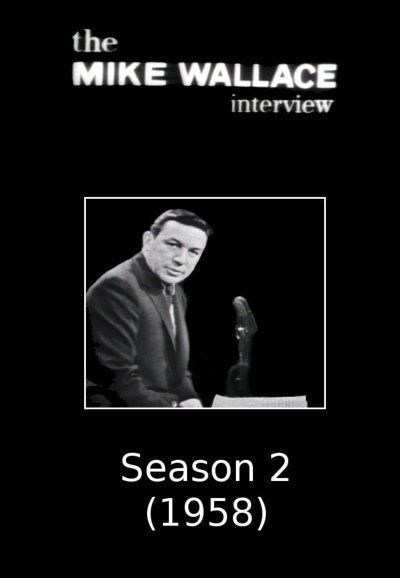

The Mike Wallace Interview
Season 2
The Mike Wallace Interview is a series of 30-minute television interviews conducted by host Mike Wallace from 1957 to 1960. Before The Mike Wallace Interview was televised nationally on prime-time in 1957, Wallace had risen to prominence a year earlier with Night-Beat, a television interview program that aired in New York City. (1957)
Where to Watch The Mike Wallace Interview • Season 2
32 Episodes
- Fulton Lewis J:r
 E5
E5Fulton Lewis J:rFulton Lewis J:r, conservative newspaper and radio commentator, talks to Wallace about the right wing in America, President Eisenhower, Vice President Nixon, General Douglas MacArthur, Francisco Franco, Adlai Stevenson, Joseph McCarthy, Eisenhower Republicans, and Democratic Liberals. - Major Donald E. Keyhoe
 E9
E9Major Donald E. KeyhoeFormer Marine Air Corps Major Donald Keyhoe, director of the National Investigations Committee on Aerial Phenomena, conducted an investigation of the existence of Unidentified Flying Objects (UFOs). Keyhoe talks to Wallace about the United States military, reports of UFO sightings, the various theories explaining UFOs, government cover-ups, and the possibility of interplanetary war. - Lillian Roth
 E13
E13Lillian RothLillian Roth, the singer whose brutally frank autobiography I'll Cry Tomorrow was made into an Academy Award-winning film with Susan Hayward, talks to Wallace about her battle with alcoholism, religion, psychoanalysis, Alcoholics Anonymous, and her new book, Beyond My Worth. - Abba Eban
 E14
E14Abba EbanAs Israel celebrates its tenth anniversary, Abba Eban, Israel's ambassador to the United States, talks to Wallace about Arab nations, the Arab refugee problem, Egypt's President Nasser, Jews in America, and the charge that Israel threatens world peace with a policy of territorial expansion. - Reinhold Niebuhr
 E16
E16Reinhold NiebuhrDr. Reinhold Niebuhr, vice president of Union Theological Seminary in New York, on leave to the Institute for Advanced Study at Princeton, and one of the most important and challenging religious thinkers in the world, talks to Wallace about the separation between church and state, Catholicism, Protestantism, anti-Semitism, communism, and nuclear war. - William O. Douglas
 E17
E17William O. DouglasWilliam Douglas, Associate Justice of the Supreme Court of the United States, talks with Wallace about freedom of expression and the freedom to exchange ideas. In Douglas's book, The Right of the People, he wrote, "In recent years, as we have denounced the loss of liberties abroad we have witnessed its decline here in America." - Adlai StevensonE21
Adlai StevensonAdlai Stevenson, former governor of Illinois and twice the Democratic candidate for the presidency of the United States, talks to Wallace about American politics, the difficulty in persuading good people to become involved in politics, diversity, elections, and the need for the average citizen to be involved in government. - Francis LallyE23
Francis LallyMonsignor Francis Lally, editor of one of the most influential Catholic newspapers in America, the Boston Pilot, talks to Wallace about a lack of understanding between Catholics and non-Catholics, the separation between church and state, dissent, diversity, and religion. - Harry Ashmore
 E24
E24Harry AshmoreHarry Ashmore, executive editor of the Arkansas Gazette in Little Rock and winner of the Pulitzer Prize for his forceful editorials denouncing the racist mobs during the desegregation conflict in Little Rock's high school, talks to Wallace about the integrity of journalists, the influence of advertisers and the government on the press, techniques of interviewing, and the desegregation of Little Rock High School. - Henry Kissinger
 E26
E26Henry KissingerDr. Henry Kissinger, Associate Director of the Center for International Affairs at Harvard University, talks to Wallace about the United States' foreign and military policies, limited nuclear war, the Soviet Union, Algeria, the Middle East, and Republicans, including Richard Nixon. - James McBride Dabbs
 E30
E30James McBride DabbsJames McBride Dabbs, South Carolinian, plantation owner, elder in the Presbyterian Church, president of the Southern Regional Council, and author of The Southern Heritage, talks to Wallace about the psychological burden of the Southerner, segregation, school integration, and the consequences of the Civil War. - Mortimer Adler
 E31
E31Mortimer AdlerMortimer Adler, president of the Institute for Philosophical Research, former professor of the philosophy of law at the University of Chicago, and author of The Idea of Freedom, talks to Wallace about conceptions of freedom, capitalism, socialism, and the American worker. - Arthur Larson
 E32
E32Arthur LarsonArthur Larson, who resigned from the Eisenhower administration after having served as Undersecretary of Labor, Head of the United States Information Agency, and Special Assistant to the president, talks to Wallace about Eisenhower, the administration's social philosophy, politics, and the American way of life.














